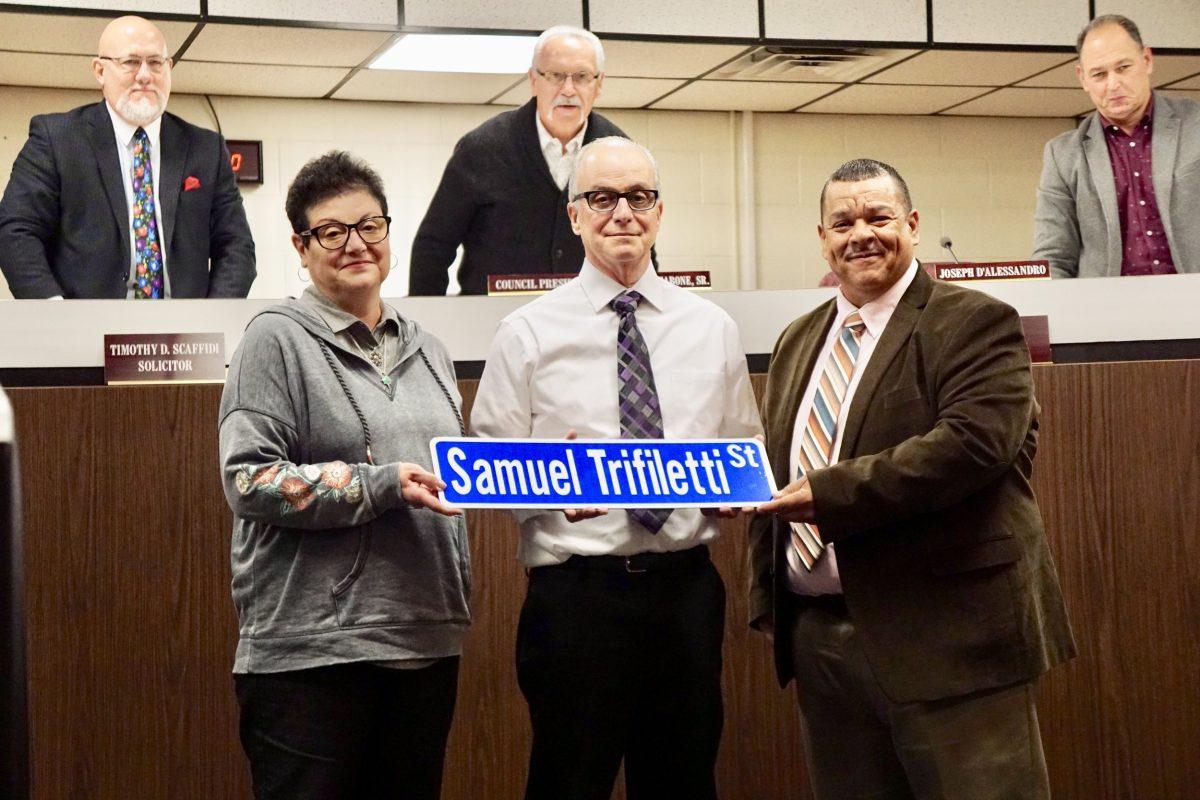Veterans of World War II are often referred to as members of the “Greatest Generation”: a fraternity of citizens who endured incredible hardship and bounced back with a spectacular resiliency unimaginable to the likes of millennials and beyond. Samuel F. Trifiletti is no different.
On Nov. 27, the Glassboro Town Council honored Trifiletti by renaming Presidential Street, Samuel Trifiletti Street.
“This dedicated man served his country and his community well,” Glassboro Mayor John E. Wallace III declared while announcing the name change.
Born on November 12, 1920, Salvatore F. Trifiletti, of Sicily, Italy, arrived in America through Ellis Island in 1925. At only five years old, Samuel, as his Americanized name would become, was awoken by his mother as they were passing the Statue of Liberty. Following their arrival, the Trifilettis moved in with relatives in Albany, New York before settling in a small New Jersey town with a sizable Italian population known as Glassboro. The choice of Glassboro is a mystery, lost in family lore, but the choice would have a tremendous impact on Samuel’s life and the community. In an incredible twist of fate, the newly minted Samuel Trifiletti Street will run through the location of the Italian enclave of his childhood.
A longtime community organizer, Trifiletti was one of the founders of the Glassboro Athletic Club, an organization dedicated to playing various sports with surrounding communities. Athletic clubs such as these were an important source of entertainment in an era prior to television. The club began in 1937, with Trifiletti participating in the baseball and football teams through the late 1930s and into 1941. His involvement with the club would come to a halt when he was drafted to serve in the war in 1942.
According to army records, Trifiletti entered the service on November 28, 1942. Given his ability to speak fluent Italian, Trifiletti was recruited into the Office of Strategic Services, the precursor to the CIA. He served in North Africa, Italy and Southern France, specializing in resupplying advancing troops from the air. In Southern France, he worked in conjunction with the Francs-Tireurs et Partisans of the French Resistance as a demolition expert, landing behind enemy lines and destroying critical Nazi infrastructure, such as bridges.
Trifiletti was transferred to the 82nd Airborne division within the United States Army in late 1944. He would serve in the infamous Battle of the Bulge, a German offensive through the Ardennes Forest in Northern France and Southern Belgium. On February 9, 1945, Trifiletti was injured by a shrapnel blast and was declared ‘missing in action.’ His family was notified on February 26 of the gravity of the situation in a letter that extended “heartfelt sympathy” during the “period of uncertainty.” Positive news would come down the pike as a Western Union note would make its way to the family a month later on the 27 of March.
Upon returning stateside, Trifiletti rejoined the Glassboro Athletic Club and began managing, organizing and coaching baseball and basketball through the 1940s and 1950s. Always eager to help members of the community, Trifiletti helped arrange major league tryouts for local ball players with the Philadelphia Athletics during their later years in the city. On one occasion, Trifiletti brought Phil Gant, a local pitcher, to Philadelphia for a tryout. While pitching to right fielder Wally Moses, Gant threw too far inside, hitting the all-star, prompting legendary A’s manager and owner to quip how he instructed Gant to “throw it past him, not through him.”
Beginning in 1962, Trifiletti coached the St. Bridget Crusaders football team to two Catholic Youth Organization championships. A fierce competitor and a fair man, Trifiletti allowed the inclusion of non-catholic players on his team. From 1963 until 1968 he coached the track team, leading the squad to a title six years in a row. Given his longtime involvement within community sports, Trifiletti coached sons of his former Glassboro Athletic club teammates and players. Driven by an intense love of the community, Trifiletti insisted on attending as many Glassboro High School sporting events as he could.
“He would go to Glassboro games, no matter what sport,” his son Carmen Trifiletti recalled.
Trifiletti served on the Glassboro Board of Education from 1973 until 1991. He had an eventful tenure in the role, helping to create the Glassboro High School Hall of Fame and securing the visitation of Hall of Fame center-fielder Willie Mays.
Samuel and Carmen were part of large crowds outside the Hollybush Mansion as President Lyndon B. Johnson and Premier of the Soviet Union Alexei Kosygin met for a summit in late June of 1967.
This was not the only time Samuel Trifiletti shared his beloved hometown with a sitting United States President.
On June 19, 1986, President Ronald Reagan gave the commencement speech for Glassboro High School’s graduation. As a member of the Glassboro Board of Education, Samuel was afforded the opportunity to sit on stage with the President.
“The two things he loved were America and Glassboro,” Carmen said. “He’d be very proud of the way Glassboro has grown today.”
For comments/questions about this story, email [email protected] or tweet @TheWhitOnline.

























































































































































!["Working with [Dr. Lynch] is always a learning experience for me. She is a treasure,” said Thomas. - Staff Writer / Kacie Scibilia](https://thewhitonline.com/wp-content/uploads/2025/04/choir-1-1200x694.jpg)









































